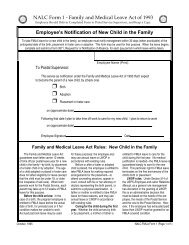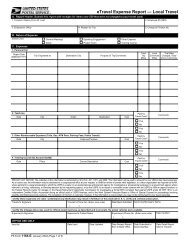Interviewing Postal Inspectors, Obtaining Their ... - NALC Branch 908
Interviewing Postal Inspectors, Obtaining Their ... - NALC Branch 908
Interviewing Postal Inspectors, Obtaining Their ... - NALC Branch 908
Create successful ePaper yourself
Turn your PDF publications into a flip-book with our unique Google optimized e-Paper software.
<strong>NALC</strong> Arbitration Advocate Page 2<br />
Volume 2, Issue 2 May 1998<br />
156#. 052'%6145 TTT<br />
(continued from page 1)<br />
commonly in discipline cases—they<br />
are no different from any other<br />
manager. This bears repeating:<br />
<strong>Postal</strong> inspectors have no special<br />
status in the grievance procedure or<br />
arbitration. Rather they are, for all<br />
intents and purposes, the same as<br />
other postal supervisors and managers.<br />
For advocates and other union<br />
representatives, this means that<br />
postal inspectors may be interviewed<br />
prior to arbitration, and in<br />
fact at any time during the processing<br />
of the grievance. <strong>Postal</strong> inspectors<br />
have no special rights to avoid<br />
interviews with investigating union<br />
representatives even though they<br />
often attempt to resist questioning<br />
until they are called to testify at arbitration.<br />
Moreover, management may<br />
not use the investigative memorandum<br />
as a shield against further inquiry<br />
into the detailed facts of the<br />
investigation. The investigative<br />
memorandum is a hearsay statement—an<br />
out-of-hearing statement<br />
that certain material facts are true.<br />
The union has the right to examine<br />
the facts underlying hearsay statements,<br />
or to insist that such statements<br />
either be excluded from the<br />
hearing or be given very little<br />
weight. Like any hearsay statement,<br />
an investigative memorandum<br />
is inherently unreliable as evidence<br />
unless it is corroborated by<br />
other, reliable evidence.<br />
Typically a postal inspector testifies<br />
at an arbitration hearing to<br />
provide the corroboration for the<br />
investigative memorandum. However,<br />
this testimony comes very late<br />
in the grievance process and affords<br />
union advocates no opportunity<br />
to prepare before the hearing.<br />
<strong>NALC</strong> representatives at earlier<br />
stages of the grievance procedure<br />
also have the right to examine the<br />
facts that stand behind the investigative<br />
memorandum. So postal<br />
inspectors must be made available<br />
for interviews, and must answer all<br />
potentially relevant questions put<br />
to them by shop stewards, advocates<br />
and other union representatives.<br />
<strong>NALC</strong> representatives also<br />
have the right to examine the notes<br />
made by postal inspectors during<br />
the course of their investigations.<br />
For instance,<br />
the representative<br />
may ask a<br />
postal inspector<br />
for all notes<br />
made in an investigation,<br />
including<br />
notes<br />
of interviews<br />
with witnesses.<br />
Furthermore,<br />
inspectors must<br />
reveal the<br />
names of people<br />
with whom<br />
they spoke and what those people<br />
said even if this information has not<br />
been recorded in the IM or in notes.<br />
Any of these original sources may<br />
provide information which is helpful<br />
to a grievant although it was excluded<br />
from or “filtered” by the investigative<br />
memorandum .<br />
Many union representatives, especially<br />
shops stewards, may be<br />
surprised to learn that they have<br />
the right to interview postal inspectors.<br />
However, this right is well established<br />
in regional arbitration<br />
precedent and in grievance settlements<br />
at the national level.<br />
'..g 56#$.+5*'&<br />
7.'5<br />
In a 1987 case decided by regional<br />
Arbitrator Joseph F. Gentile,<br />
a letter carrier was discharged for<br />
156#. +052'%6145<br />
*#8' 01 52'%+#.<br />
56#675 +0 6*'<br />
)4+'8#0%' 241%'g<br />
&74'T *'; #4' 6*'<br />
5#/' #5 #0; 16*'4<br />
2156#. /#0#)'4 14<br />
572'48+514T<br />
allegedly removing marked quarters<br />
from test letters. Two postal<br />
inspectors had prepared the test<br />
mailing. <strong>NALC</strong> representatives attempted<br />
to interview the postal inspectors<br />
but were refused at each<br />
step of the grievance procedure. A<br />
second grievance filed to protest<br />
that refusal. During the discussion<br />
of the second grievance, the postmaster<br />
claimed that he had no jurisdiction<br />
over postal inspectors, and<br />
the Step 3 answer stated that Inspection<br />
Service<br />
investigative<br />
techniques<br />
“are not subject<br />
to automatic<br />
disclosure.”<br />
The<br />
two grievances<br />
were combined<br />
for hearing.<br />
Arbitrator<br />
Gentile agreed<br />
to hear the<br />
procedural issue<br />
first. The union argued that the<br />
<strong>Postal</strong> Service violated several sections<br />
of the National Agreement<br />
when it refused to make the postal<br />
inspectors available for the interview:<br />
♦ Article 15, Section 2, Step 2(d)<br />
requires the employer to “make a<br />
full and detailed statement of facts<br />
and contractual provisions relied<br />
upon.”<br />
♦ Article 17, Section 3 states,<br />
“The . . . Union representative<br />
properly certified in accordance<br />
with Section 2 above may request<br />
and shall obtain access through the<br />
appropriate supervisor to review<br />
the documents, files and otherrecords<br />
necessary for processing a<br />
grievance or determining if a<br />
grievance exists and shall have the<br />
right to interview the aggrieved<br />
employee(s), supervisor and wit-<br />
(Continued on page 3)











